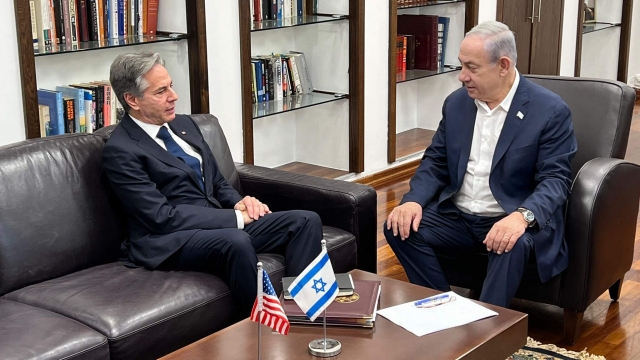U.S. Secretary of State Antony Blinken is back in Israel, urging the nation's leaders to protect civilians in Gaza and help facilitate the delivery of essential aid to the besieged region.
The secretary held a private meeting with Prime Minister Netanyahu at the Kirya in Tel Aviv on Friday morning and met with other top officials, including members of Israel’s War Cabinet.
Blinken's visit on Friday marks his third trip to Israel since the conflict started on Oct. 7, and comes in response to President Joe Biden's call for a “humanitarian pause” in the fighting in order to arrange the evacuation of dual citizens and foreigners in Gaza, secure the release of over 240 hostages held by Hamas, and boost humanitarian aid for Gaza's civilians.
However, following the meeting with Blinken, Netanyahu refused a temporary Gaza Strip cease-fire and vowed to continue the military offensive until Hamas releases the hostages.
During his visit, Blinken told reporters that more needs to be done "to protect Palestinian civilians," and emphasized Israel's right to self-defense while also advocating for adherence to the rules of warfare.
"Civilians should not suffer the consequences for [Hamas'] inhumanity and its brutality," Blinken said. "We provided Israel with advice that only the best of friends can offer on how to minimize civilian deaths while still achieving its objectives of finding and punishing Hamas terrorists and their infrastructure violence."
Additionally, he discussed potential postwar scenarios for governing the territory in the event that Israel eradicates Hamas, and trying to prevent the conflict from widening.
"The idea of Hamas remaining responsible for governance such as it was and posing an ongoing and enduring threat to Israel and its citizens is unacceptable," said Blinken. "We also know that Israel cannot reassume control and responsibility for Gaza, and it's important to note that Israel has made it clear that it has no intention or desire to do that. So within those parameters, we are and will continue to have discussions with partners throughout the region and well beyond about what should follow.
SEE MORE: Israel at War: Casualties of Conflict
This visit comes as Israeli military officials say that their forces have effectively completely surrounded Gaza City, and a significant number of them have entered the region.
According to Israeli officials, this densely populated area serves as a primary stronghold for Hamas militants, containing an extensive network of bunkers, command centers and underground tunnels, and the conflict there has involved direct confrontations with Hamas militants.
Gaza has been under a total blockade since Hamas attacked Israel last month, and this most recent barrage of strikes in Gaza is worsening the already dire humanitarian situation there.
Lack of fuel, food, water and medical supplies is causing tremendous human suffering.
In the past week, Israel has allowed some humanitarian relief through the region, but the U.S. says the continued attacks make distributing that relief extremely dangerous. Blinken says that over 100 trucks are going into Gaza through the Rafah crossing every day, but it's still not enough.
"I spoke to Israeli leaders about tangible steps that can be taken to increase the sustained delivery of food, water, medicine, fuel, and other essential needs while putting in place measures to prevent diversion by Hamas and other terrorist groups," said Blinken.
According to Blinken, Israeli officials informed him of concerns that Hamas is hoarding fuel and keeping it away from the hospitals and civilians who need it most.
Evacuations are giving some hope, but escaping Gaza is nearly impossible for the thousands who are hurt, lost, or afraid of being caught in the fighting.
Evacuations have picked up at the border crossing between southern Gaza and Egypt, with U.S. officials saying more than 70 American citizens were able to leave the territory Thursday, but hundreds more are still waiting to get out.
Trending stories at Scrippsnews.com




